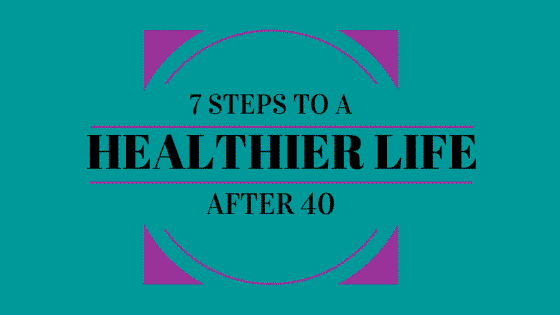
7 Steps to A Healthier Life After 40
What does it means to be over 40, or if it fits you better, over 50 or over 60? Notice that the one word that keeps coming up is o-v-e-r. Sometimes it gets taken even a bit further; overtired, overworked, overstressed, overweight, overcommitted, relationship over. Yes, it seems when we hit a milestone, life is “over.”
But it doesn’t have to be that way. And to help you be certain it isn’t that way for you, answer two questions and follow my 7 steps to a healthier life after 40, 50 or 60 (you pick the correct one).

First identify which of the “over” words has you most worried – are you overly stressed, tired or anxious? Are your clothes overly tight? Are you wishing some of your relationships were over? Do you work overly hard?
Next, ask yourself if you have internalized these beliefs; do you find yourself concerned about whether or not you will remain healthy, desirable, lovable or employable? If you do feel immobilized and stuck or feel your vitality and health slipping away, it can change if you reframe your beliefs to give you more control. Here are my 7 tips to make that happen.
1. Permission
This is the first step and one of the most challenging. Henry Ford said, “Whether you think you can or you think you can’t, you’re right.” What beliefs immobilize you? Why? It’s often said that people who live in the past feel depressed and those who live in the future feel anxious. What can you do to live in the present — to experience this moment as a joyous experience? Visualize where you want to be or what you want to happen and move toward that place. Give yourself permission and freedom becomes possible.
2. Associations
Dan Buettner, author of Blue Zones, found that people who socialize live longer, healthier lives. Whether you are spending time with friends or family or in a connected group such as your congregation or other social experience, doing so regularly helps provide beliefs, behaviors and perspectives that are liberating and that contribute to freedom, happiness and longevity.
3. Stress Reduction
People have always known stress. A little stress is helpful and prepares you for a presentation or sporting event, and other challenges. But chronic stress is toxic and is responsible for up to 80 percent of primary care visits to the doctor. Yet only 3 percent actually receive stress management counseling. Stress and its sidekick, fear, can hold you in your current situation and prevent you from trying new things. The future can be brighter if you simply move toward the light. As Joseph Campbell said, “The cave you fear to enter holds the treasure you seek.” What are you avoiding that could set you free?

4. Sleep More
70 million adults don’t get the seven or more hours of sleep each night they need. That leads to poor memory, poor performance on the job, poor family dynamics, falling asleep at the wheel, obesity, diabetes, high blood pressure, heart disease and more. If you feel bad and sleepy, you are much less likely to risk doing or seeing things differently. You have to be alert to find and follow the path to new freedom.
5. Organize
Are you surrounded by piles of clutter? Can’t see over or around it to try things differently? Organizing can change that. Clear the piles that clutter your home, office and mind. You may find a letter offering you a new position or notes you took from me about the website www.FreeMenopauseHelp.com giving you a FREE year’s subscription to My Menopause Magazine. Organizing your day with blocks of time to think of and try new things can suddenly open the door to opportunity.
6. Vocalize
Think of this in two ways: 1) Sing. It frees your spirit to move to a new place and 2) Speak what is on your mind. Saying your fears out loud, verbalizing what you want to achieve or where you want to be makes it real and makes it possible.
7. Exercise
Poor health and obesity can be very restrictive. You can’t do the things you want to do or some of the things that bring you joy. Make exercise a habit, one you do every day. Start with just five minutes daily and work up to 30 or even 60 minutes. Your brain and body will work better and longer and your spirits will rise.
Remember, it’s better to Stay Well than to Get Well.
About Dr. Mache
 Mache Seibel, MD is an international health expert on women’s wellness and menopause. You can bring your questions or just listen to others each month on his free live calls by visiting AskDrMache.com. Take the Menopause Quiz and discover how much your symptoms are affecting you and how you compare to other women going through the same experience.
Mache Seibel, MD is an international health expert on women’s wellness and menopause. You can bring your questions or just listen to others each month on his free live calls by visiting AskDrMache.com. Take the Menopause Quiz and discover how much your symptoms are affecting you and how you compare to other women going through the same experience.
© Mache Seibel, MD










